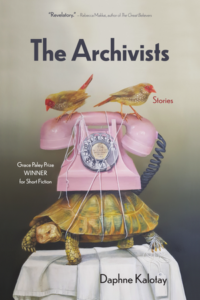Today’s special guest is short story writer Daphne Kalotay to chat about The Archivists: stories.

Bio:
Published in 20+ languages, Daphne Kalotay’s books include the bestselling novels Sight Reading and Russian Winter—winners of the New England Society Book Award and Writers’ League of Texas Fiction Prize, respectively—and Blue Hours, a Massachusetts Book Awards “Must Read.” She is also the author of two story collections: The Archivists, winner of the Grace Paley Prize, and Calamity and Other Stories, shortlisted for The Story Prize. A recipient of fellowships from the Christopher Isherwood Foundation, MacDowell, and Yaddo, she lives in Somerville, Massachusetts.
What do you enjoy most about writing short stories?
I love their intimacy. To me there’s a magical feeling of immediately closely entering a character’s world when I write a story. The path to closeness isn’t as long as it can be when I write a novel. And I love that stories don’t feel as large and unwieldy as novel-writing can feel; I rarely have the overwhelmed feeling of “how am I ever going to finish this” that I experience when writing my novels.
Can you give us a little insight into a few of your short stories – perhaps some of your favorites?
The title story of The Archivists is partially inspired by my paternal grandmother and actual stories she told me about surviving World War Two; it’s also infused with my love of dance (which readers of my novel Russian Winter will find familiar). I think it’s a story people connect with, because it ended up being a LitHub Daily selection as well as a “Distinguished Story” in Best American Short Stories 2019. My family’s stories of the war also made their way into the opening story, “Relativity,” which has a special spot in my heart because even though it’s about a serious topic, it’s told with a sense of humor that’s meant to convey the absurdity in the world. Since this story ended up being selected for One City One Story Boston, I got to hear many New Englanders discuss it, which was an incredibly moving experience for me. Another story I like that was a late addition to the book is “A Guide to Lesser Divinities,” which is probably the most humorous of the stories. I like that the narrator has her faults yet is self-confident and funny, even when she’s wrong.
What exciting story are you working on next?
I’m working on a novel that, like my novel Russian Winter, interweaves past and present to illuminate the ways that history stretches into the present day. It’s a somewhat gothic mystery set on two continents, with converging storylines.
When did you first consider yourself a writer?
I remember in grade 2, someone gave me a little blank book, like a diary or journal, and I tried to write a short story in it but couldn’t figure out how to end it. I also wrote down a dream I had and wanted to develop it into something, but I didn’t know how. I remember even then feeling the frustration of not understanding how to take an idea and turn it into more than that.

What would you say is your interesting writing quirk?
I often work on more than one book at once. I’ll work on one for a few months, then return to the other, back and forth….
As a child, what did you want to be when you grew up?
I remember wanting to write a story about my friend’s street, which had a lot of kids on it and was a much more fun place than my street (which didn’t have many families with children). I told my babysitter I wanted to write about it when I grew up, and she very smartly asked what I was waiting for, why I didn’t start writing about it now.
Anything additional you want to share with the readers?
I abide by the advice of the great Arthur Ashe: “Start where you are, use what you have, do what you can.”
